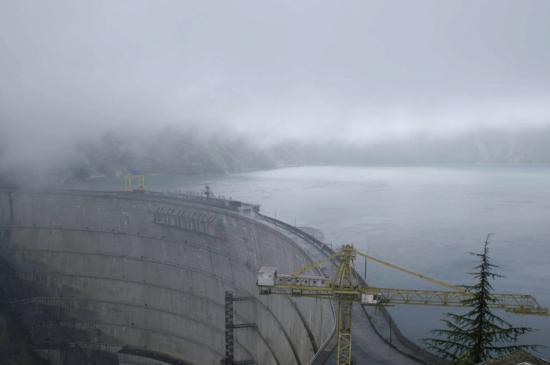


Maradia Tsaava: Water Has No Borders

First some background:
Since the end of the civil war in the early 1990s, the region of Abkhazia has been acting independently of Georgia. This has turned a massive dam into a border. But the hydroelectric power station also connects the two political entities: Because over a distance of fifteen kilometres the water flows freely, underground, from one side to the other. When a young journalist gets stranded here, stories of division emerge.
On the way back from a reportage trip to the dam, director Maradia and her cameraman’s car breaks down. Ika takes care of them. For decades, the joyous engineer has worked – in cooperation with his colleagues on the Abkhazian territory – on the maintenance of the plant. Maradia, representative of a whole generation of Georgians who know this place of longing on the Black Sea only from stories, becomes curious. But while the workers take the bus across the border every morning, the film crew is thwarted by bureaucracy. Time and again they are denied passage. This turns out to be fortunate for the film, because waiting for the permission, in the cafeteria of the dam, in driving around the river, the stories of people emerge whose lives are shaped by the secession. They talk of legal and clandestine border crossings, weddings and funerals and of life in the here and there. (Written by Marie Kloos, taken from the website of DOKLeipzig).
And then my evaluation:
… of a film that is shown at DOKLeipzig (world premiere) and is in the international competition section. A film that took me by heart and mind. The latter because again you are faced with the stupidity of humanity, another border, in this case a border at a dam with a tunnel that reaches both sides – Georgia and Abkhazia. A separation of people, of human beings who can not visit their relatives. Every morning Georgian workers cross the border to meet checkpoints with permits in their hands and then in the evening they go back again. Yet water has no borders and the two sides profit from the power of nature: electricity is provided.
… of a film that impressed me visually. It must have been the best job ever of cameraman Nik Voigt, who is giving the viewer stunning images of the colossal dam architecture and its mountain surroundings, the blue sky and more often the clouds, the fog, different angles and then down to the tunnel or filming the power of the water of the Enguri river. Up and down. With the accompanying noise, thanks for having some longer silent sequences that invite the viewer to “just” reflect and enjoy.
… of a film with wonderful persons introduced by and/or talked to by the director Maradia (also called Maro) Tsavaa. I hate the word “character”, therefore “persons” or protagonists, real people from the real world. I want to mention the three that appear first in the credits: Irakli Pipia, Roza Tsotsonava, Luda Akobia Holodova. All three with stories about relatives, about childhood and upbringing, about hard lives, about (Roza) being allowed to cross the border one time, three years ago to go to a funeral! About finally getting a fridge for the food she serves with Luda in the cafeteria. Politics – some officials can get the permit, “we can not ». But it is not only bitterness, it’s also memories from before the separation, when the river was surrounded by villages.
Number one, however, is Ika, who is close to the director all the time and who drives and walks her close to the border, who likes a beer or two, who is full of joy and yet says, sarcastically and with sadness in one of the excellent sequences with him and the director in his car : « Hurray we are alive ». Cut immediately to the two, Ika and Maro, dancing wildly to « Long Tall Sally » ! The film’s comment to Ika and his enjoying Life. Great. And after that a dancing girl, georgian music. A film that took me by heart and mind.
Georgia, France, 2021, 85 mins.